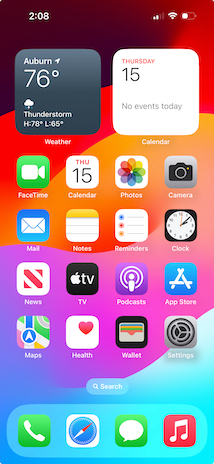
Back آي أو إس 17 Arabic IOS 17 Catalan IOS 17 CE ئای ئۆ ئێس ١٧ CKB IOS 17 German IOS 17 Greek IOS 17 Spanish IOS 17 ET آیاواس ۱۷ FA IOS 17 French
| Version of the iOS operating system | |
 | |
 iOS 17 home screen on an iPhone 13 | |
| Developer | Apple |
|---|---|
| Written in | C, C++, Objective-C, Swift, assembly language |
| OS family | iOS |
| General availability | September 18, 2023 |
| Latest release | 17.7.2[1] (November 19, 2024) [±] |
| Available in | 42 languages[2] |
| Kernel type | Hybrid (XNU) |
| License | Proprietary software with open-source components |
| Preceded by | iOS 16 |
| Succeeded by | iOS 18 |
| Official website | iOS 17 at the Wayback Machine (archived June 3, 2024) |
| Tagline | Every day. More extraordinary. |
| Support status | |
| Obsolete, no longer receiving security updates, because all iPhones that supported iOS 17 support iOS 18 as well. Widespread third-party app support. Drops support for all A11 Bionic chips, including the iPhone 8/iPhone 8 Plus, and iPhone X. | |
| Articles in the series | |
| iPadOS 17 (derivative for iPad) | |
iOS 17 is the seventeenth major release of Apple's iOS operating system for the iPhone. It is the direct successor to iOS 16, which was released one year earlier. It was announced on June 5, 2023, at Apple's annual Worldwide Developers Conference alongside watchOS 10, iPadOS 17, and macOS Sonoma. It was made publicly available on September 18, 2023, as a free software update for supported iOS devices (see the supported devices section).[3] It was succeeded by iOS 18 on September 16, 2024.
- ^ "About the security content of iOS 17.7.2 and iPadOS 17.7.2". Apple Inc. November 19, 2024. Retrieved November 19, 2024.
- ^ "iPhone 15 – Technical Specifications". Apple. Archived from the original on September 14, 2023. Retrieved October 26, 2023.
- ^ Clover, Juli (September 18, 2023). "Apple Releases iOS 17 With StandBy, Live Voicemail, Improved Autocorrect, FaceTime Video Messages and Tons More". MacRumors. Archived from the original on September 18, 2023. Retrieved September 18, 2023.